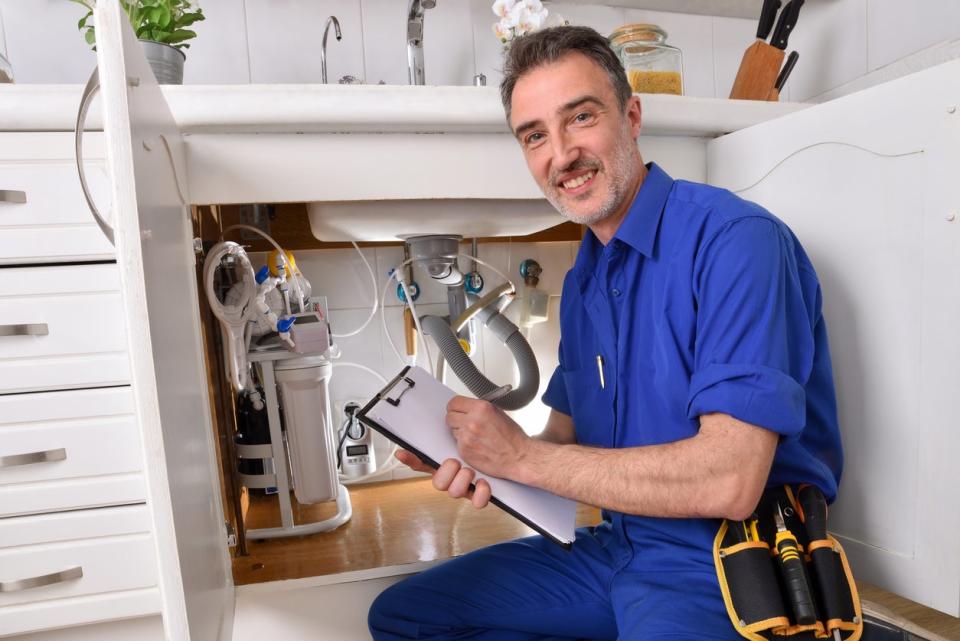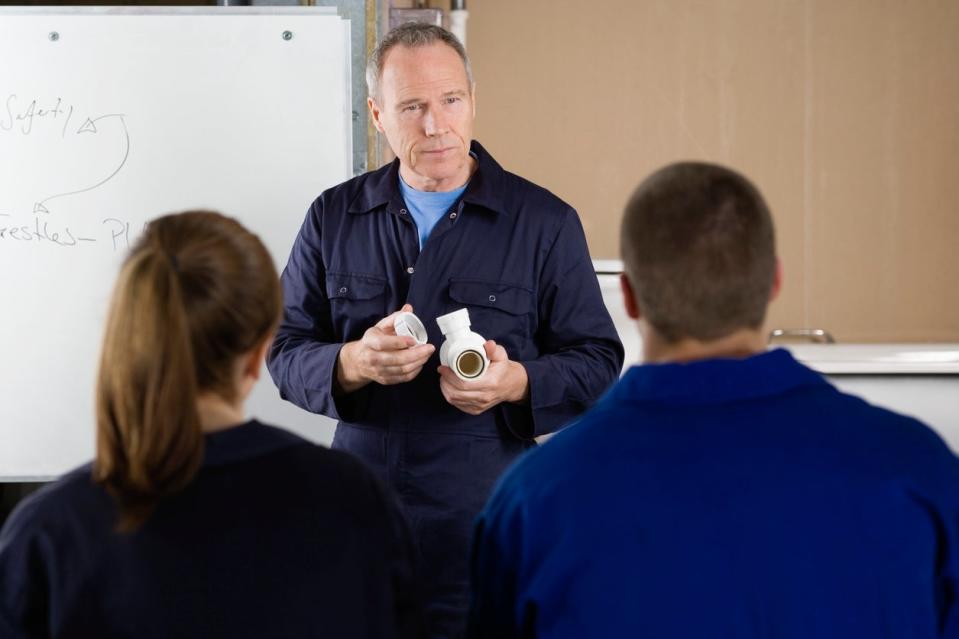How to Promote Yourself and Become a Master Plumber

Starting a career as a plumber contractor is a great option for those looking for a challenging job with a change of setting and new puzzles to figure out with every appointment. All it takes to become a plumber is to complete high school or get a GED, then apply to a trade school or plumbing apprenticeship program to begin working as an apprentice plumber.
After about 4 years, an apprentice can take the journeyman plumber test to get their plumber license, but there is room for further growth in this industry. Journeyman plumbers who have worked for 3 to 4 years can apply with the state plumbing board to take the master plumber exam.
According to James De Meo, master plumber and HVAC engineer at Montgomery, Alabama-based home improvement website This Fixed House, “The basic difference between the two levels is that a [journeyman] plumber is a trained professional who can perform most plumbing tasks. A master plumber has the standard training, plus on-the-job experience, and then [attains] a higher level of technical certification demonstrating expertise.”
This plumbing certification indicates that the individual has a high level of training, experience, and knowledge in the plumbing field. Additionally, master plumbers receive a higher average plumber salary and can take on apprentices, which is beneficial when starting a new plumbing business. Apprentice or journeyman plumbers can learn how to become a master plumber while planning out their career path.

Photo: istock.com
Before You Begin...
Master plumbers are essentially journeyman plumbers who have spent extensive time training and working in the industry to improve their knowledge and skills. Before pursuing a master plumbing license, it’s important for a plumber to understand the benefits, drawbacks, and responsibilities of this certification. In this career, the master plumber will offer a range of services, including installing, maintaining, and repairing plumbing systems. A master plumber may work in residential, commercial, industrial, or institutional settings, as well as completing plumbing projects both indoors and outdoors.
“As a plumber, I do general plumbing work, but as a master plumber, I can design plumbing systems and manage larger projects,” says Andrew Miles, CEO at WaterFilterCast.com, a website providing expert advice on plumbing, water filtration, and water softening. “To become a master plumber, I had to complete additional years of [training] and pass a more comprehensive exam.”
Master plumber hourly rates are typically about $40.05, though wages can range between $30.77 to $45.43 per hour. After completing high school or acquiring a GED, a student can expect to spend about 6 to 10 years to become a master plumber. This time is spent studying, training, and working as an apprentice plumber and a journeyman plumber. Master plumbers may work for an established plumbing company or start their own business. They can also take on apprentices, making it easier to accept additional work when the business is just getting started. Plumbers will want to take some time to decide if this is the right career for them before starting the process of becoming a master plumber.
Tips for How to Become a Master Plumber
Study unfamiliar plumbing systems as an apprentice and journeyman plumber.
Consider enrolling in additional trade school courses to further personal education.
Work in a variety of settings to broaden the personal scope of knowledge.
Take a free master plumber practice test before attempting the master plumber exam.

Photo: istock.com
STEP 1: Review the license requirements in your state for a master plumber.
Each state has its own regulations when it comes to plumbing licenses. While some states don’t require a plumbing license, others may not specifically offer master plumber licenses; therefore, the first thing for a plumber to check is whether they can even get a master plumber license in their state.
Depending on the state, a plumber may be required to work a certain number of hours or years as a journeyman plumber before they are eligible for a master plumber license. They may also need to take a licensing exam, and some states have plumber education requirements for those who want to apply for a master plumber license, which means an individual will need to budget for plumbing school costs. Below is a list of requirements by state; however, the best way for a plumber to understand the requirements in their area is to reach out to their local plumbing board or to the Secretary of State’s office.
State | Master Plumber License Requirements |
Alabama | Work at least 1 year as a journeyman plumber and pass an exam. |
Alaska | State does not offer a master plumber license. |
Arizona | State does not offer a master plumber license. |
Arkansas | Work at least 5 years as a plumber (including at least 1 year as a journeyman plumber). |
California | State does not offer a master plumber license. |
Colorado | Work at least 5 years as a plumber, pass an exam, and submit an affidavit of eligibility. |
Connecticut | State does not offer a master plumber license. |
Delaware | Work at least 7 years as a journeyman plumber. |
Florida | State does not offer a master plumber license. |
Georgia | Work at least 5 years as a plumber (including at least 2 years as a journeyman plumber) and pass an exam. |
Hawaii | Work at least 2 years as a journeyman plumber and pass an exam. |
Idaho | State does not offer a master plumber license. |
Illinois | State does not offer a master plumber license. |
Indiana | State does not offer a master plumber license. |
Iowa | Work at least 2 years as a journeyman plumber and pass an exam. |
Kansas | State does not have any plumbing license requirements; local requirements may apply. |
Kentucky | Work at least 4 years as a plumber; provide proof of general liability, workers’ compensation, and unemployment insurance; and pass an exam. |
Louisiana | Work at least 5 years as a plumber, have a current journeyman plumber license, and pass an exam. |
Maine | Work at least 4 years as a trainee plumber, at least 1 year as a journeyman plumber, and pass an exam. |
Maryland | Work at least 2 years as a journeyman plumber, have at least 3,700 hours of training under a licensed master plumber, and pass an exam. |
Massachusetts | Work at least 1 year as a journeyman plumber and complete tier five of the five-tier Plumber Educational Program. |
Michigan | Work at least 2 years as a journeyman plumber and pass an exam. |
Minnesota | Work at least 1 year as a journeyman plumber and pass an exam. |
Mississippi | State does not offer a master plumber license. |
Missouri | Work at least 3 years as a journeyman plumber and pass an exam. |
Montana | Work at least 4 years as a journeyman plumber, with at least 3 of those years working with a master plumber or as a plumbing supervisor. |
Nebraska | State does not have any plumbing license requirements; local requirements may apply. |
Nevada | Work at least 2,000 hours as a journeyman plumber. |
New Hampshire | Work at least 6 months as a journeyman plumber and pass an exam. |
New Jersey | Work at least 1 year as a journeyman plumber and pass an exam with at least 70%. |
New Mexico | State does not offer a master plumber license. |
New York | Work at least 7 years as a plumber (including at least 2 years as a journeyman plumber) and pass an exam. |
North Carolina | State does not offer a master plumber license. |
North Dakota | Work at least 2 years as a journeyman plumber, complete 4 hours of continuing education, and pass an exam. |
Ohio | State does not offer a master plumber license. |
Oklahoma | State does not offer a master plumber license. |
Oregon | State does not offer a master plumber license. |
Pennsylvania | State does not have any plumbing license requirements; local requirements may apply. |
Rhode Island | Work at least 5 years as a journeyman plumber and pass an exam. |
South Carolina | State does not offer a master plumber license. |
South Dakota | State does not offer a master plumber license. |
Tennessee | State does not offer a master plumber license. |
Texas | Work at least 8,000 hours as a journeyman plumber and pass an exam. |
Utah | Work at least 2 years as a journeyman plumber and pass an exam. |
Vermont | Work at least 1 year as a journeyman plumber, have at least 14,000 hours of training and experience, and pass an exam. |
Virginia | Work at least 10 years as a plumber (or at least 1 year as a journeyman plumber) and pass an exam. |
Washington | State does not offer a master plumber license. |
West Virginia | Work at least 12,000 hours as a plumber, be able to supervise trainee and journeyman plumbers, and pass an exam. |
Wisconsin | Work at least 3 years as a journeyman plumber or have a college degree in a related field, and pass an exam. |
Wyoming | State does not have any plumbing license requirements; local requirements may apply. |
STEP 2: Complete the required number of hours working as a journeyman plumber.
Most states that offer master plumber licenses require an individual to work a minimum number of hours or years as a journeyman plumber before they can apply for their master license.
Working with a master plumber as a journeyman can help prepare an individual to become a master plumber themselves. A journeyman plumber doesn’t need a master plumber to oversee their work, but in order to further their plumbing experience, skill, and knowledge, it’s a good idea for them to find a master plumber to work with. Plumbers can check to see if there is a master plumber license lookup for the area. This program isn’t available in every location, but in the areas where it is available, this lookup program can help a journeyman plumber quickly find a master plumber.
PRO TIP
“Master plumbers spend years training on the job as an apprentice and journeyman plumber before getting the opportunity to take the master plumber licensure exam. Plumbers that aspire to get their master plumber license should use this time to diversify their knowledge of the industry and build their expertise.”
—Timothy Dale, BobVila.com contributor and former Industrial, Commercial, and Institutional (ICI) Plumbing Project Manager
According to Bill Bruininga, co-owner of Billy’s Plumbing and Rooter in Chatsworth, California, “A plumber is someone able to diagnose and solve problems. A master plumber is at the highest level with the ability … to solve the most complex issues [with no extra effort]. You become a master with experience.”

Photo: istock.com
STEP 3: Study for the master plumber exam and get your license.
Not all states require a licensing exam for master plumbers; however, those that do may have resources available to help a plumber study for their exam. This could include study guides, practice exams, or sample questions. In general, a master plumber exam will cover a range of subjects in order to thoroughly test the knowledge of the test-taker. Common subjects include the installation of plumbing systems, fire suppression systems, storm drainage systems, water supply systems, basic repair and maintenance of plumbing systems, advanced repair and maintenance of plumbing systems, and plumbing terminology. The test may also include questions about the International Plumbing Code (IPC), the International Fuel Gas Code (IFGC), laws, rules, and regulations that have been adopted by the examining board of plumbers.
According to De Meo, “The step up to master plumber typically involves qualifying in advanced plumbing concepts and systems, comprehensive knowledge of codes, management and supervision, reading designs and blueprints, and business ethics.”
Plumbers may want to consider taking a free master plumber practice test to help determine how ready they are for this step. Some individuals may need to enroll in additional classes to improve their knowledge and understanding of plumbing systems before taking the master plumber exam.
STEP 4: Consider starting your own plumbing business and offering apprenticeship programs to help aspiring plumbers on their career journey.
Obtaining a master plumber license is an accomplishment that takes time, effort, and dedication. It’s often considered the last step for many plumbers in their professional careers, so after passing the master plumber exam, a plumber will want to take some time to celebrate this achievement. When it’s time to get back to work, new master plumbers will need to decide if they will continue to work for the same company or if they will use this certification to get a raise, pursue a career with another established company, or even start a new plumbing company.
One of the benefits of becoming a master plumber is the ability to help aspiring plumbers learn the trade by offering apprenticeships. Many of the best plumbing services offer apprenticeships, as do newly licensed master plumbers who opt to start their own businesses. Plumbing apprentices cannot work on their own without supervision, so it may seem counterintuitive to hire apprentices at a new plumbing company. However, apprentices are typically paid less than journeyman plumbers, so hiring a plumbing apprentice is a great way for a master plumber to ensure there is a second set of hands on any job without paying a high salary for a journeyman or a second master plumber, which would likely translate to higher customer costs to hire a plumber.
A master plumber can also advise an apprentice on the best online plumbing courses that can help broaden their knowledge. When training an apprentice, a master plumber will want to make sure they share expert plumbing tips or advice about working in the plumbing business. Plumbing apprentices can bring new ideas and a fresh perspective to the job while providing master plumbers with the opportunity to pass on their skills and experience to a newer generation. Many master plumbers also find that training a new apprentice is a great way to further their own skills and enhance their understanding of the job. For those who are running their own business, training one or more apprentices within the company can be a clever way to grow a plumbing business and ensure the company’s future. The master plumber can train the apprentices in how they operate, then take the apprentices on as journeyman plumbers after they have completed their apprenticeship.
It takes a lot of time and dedication to become a master plumber. An apprentice plumber needs to work several years before taking the journeyman plumber test; then as a journeyman plumber, an individual will need to spend another 3 to 4 years working and increasing their personal knowledge, skills, and experience before they can take the master plumber exam. After passing this plumbing test, an individual can use this certification to negotiate a higher master plumber salary, take on unique master plumber jobs, and start training their own apprentices. While master plumbers do not need to start their own plumbing business, it can be a great way to further their career and show up when potential customers are searching online for “hire a plumber near me.”
Sources: ZipRecruiter, Jobber

